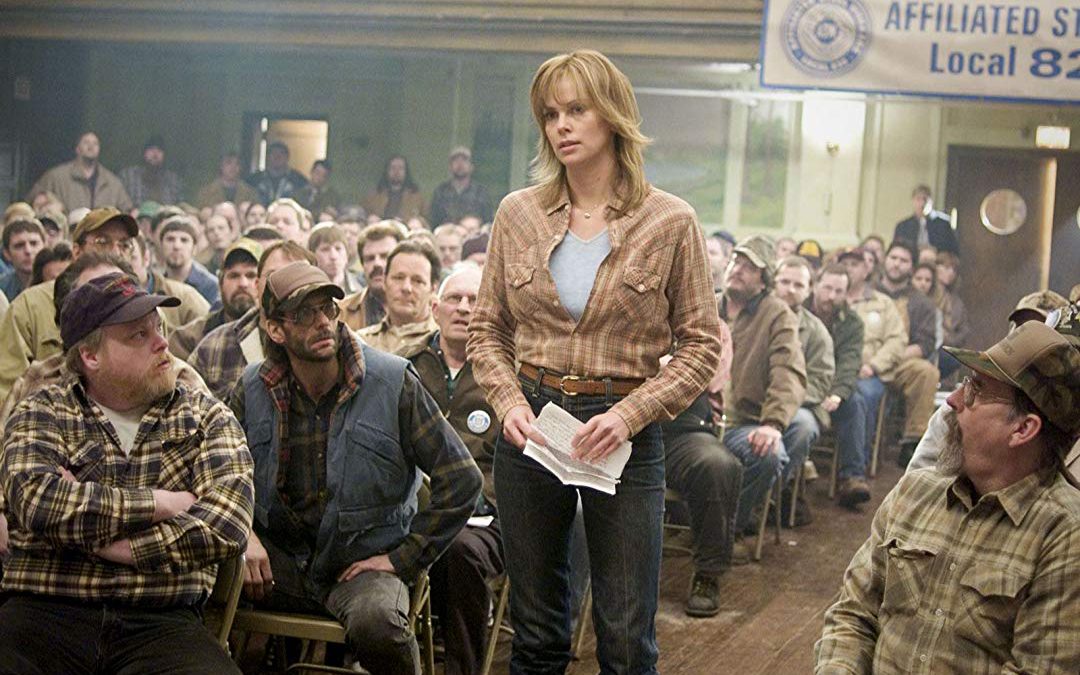In North Country (2005, dir. Niki Caro), Academy Award-winning actress Charlize Theron stars in the inspirational story of women pursuing careers and facing harassment in northern Minnesota’s mining industry in the 1980s. In collaboration with Winona State’s Common Book project, the “Careers, Conflicts and Callings Film Series” will present North Country at 7 pm Tuesday, Oct. 15, in Stark 103 Miller Auditorium.

Josey Aimes (Charlize Theron) prepares to address members of her union in North Country (2005).
The film was inspired by the 2002 book, Class Action: The Story of Lois Jenson and the Landmark Case That Changed Sexual Harassment Law (Clara Birmingham and Laura Gansler), which chronicled the first class-action lawsuit for sexual harassment in American history: Jenson vs. Eveleth Taconite Company. Theron plays Josey Aimes, a composite character based on Jenson, who faces similar discrimination for no reason other than being a woman in a male-dominated workplace.
Winona State’s Common Book Project brings together thousands of readers in discussion of a single book. This year’s selection is Dr. Mona Hanna-Attisha’s What the Eyes Don’t See. Dr. Hanna-Attisha, an Associate Professor of Pediatrics and Human Development at Michigan State University, has been awarded the Freedom of Expression Courage Award by PEN America and been named one of “Time” magazine’s 100 Most Influential People. Like Lois Jenson and her fictional counterpart played by Theron, Dr. Hanna-Attisha is also a whistleblower who speaks truth to power and makes sacrifices in order to achieve what is just.
In North Country, Josey (Theron) is fleeing from her abusive husband when she stumbles on an opportunity that will help her generate enough revenue and allow her to solely provide for her children: working in the mine. But the men who dominate her workplace treat her as a sexual object and lower-class citizen. It seems she and the other women must suffer humiliation or risk losing their jobs. In the 1970s and 80s, the rights granted as a result of the civil rights movement had still not managed to challenge patriarchal society. Women in the workplace were still seen as second-class citizens taking jobs away from more deserving men.

As the fourth film in our series examining the year’s Career Readiness theme, North Country has much to tell us about careers. Here are our four takeaways from the film:
Women can have it all–or at least the equality they deserve. Many Hollywood films tend to portray women as having to sacrifice their career in order to be “happy” or to “find love”—this is not the case in North Country. The film reinforces that single mothers are capable of maintaining a healthy relationship with her children and also providing for them, but it is going to take determination.
Do not be confined by patriarchy. The women of North Country are demeaned just for being a woman who is willing to do what is deemed a “man’s” job. When men feel their masculinity is threatened, they purposely harass women to prove their superiority. The women stay resilient throughout the harassment and aspire to break the normal societal system.
Persevere despite the circumstances. Each day the women in the film are put through harassment and abuse from their male co-workers, including the supervisors and men of power in the company. Women still come and work hard everyday knowing how they will be treated at work. However difficult, the women persevered through all they are put through.
Be the change you want to see. Josey changes her attitude and outlook in her workplace. She reaches out to authority figures in the company and addresses sexual harassment directly while other women respond with fear and self-preservation. Despite what people thought of her and the lack of support from her community, Josey–like the real-life Lois Jenson on whom her character is based–is the first to fight for a change in her work environment.
The film is directed by Niki Caro, the New Zealand director known for Whale Rider and The Zookeeper’s Daughter, both of which, like North Country, demonstrate her passion for strong female protagonists working against oppression. In Hollywood, female directors are scarce–accounting, typically, for only four to seven percent of all releases in any given year until now–we are happy to share this female-directed and female-centric film in our series on Careers. One day we hope to see far greater equality of representation behind the camera, not just in front of it.
North Country is a film everyone needs to see and experience in a theater with an audience. The film portrays hard work and true grit of women who work hard for what they want. Powerful and shockingly relevant to today, the film clearly addresses how women were–and sometimes, still can be–treated in the workplace. Please join us, again, Oct. 15, 7 pm, Miller Auditorium, Stark 103, on Winona State campus. For more updates check out the Winona Film Studies page on Facebook.
Admission is free and the film is rated R.


Trackbacks/Pingbacks